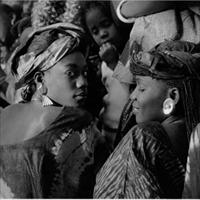Women make history

On 8 March 1857, women garment workers in New York City, USA, marched and picketed, demanding improved working conditions, a 10-hour day and equal rights to men. Their ranks were broken by the police.
Fifty-one years later, on 8 March 1908, 15,000 New York women garment workers marched again, this time demanding the vote and an end to sweatshops and child labour.
International Women's Day is marked on this date by women's groups around the world. It is commemorated at the UN and is designated in many countries as a national holiday.
The landscape for women's rights has changed dramatically over the past century. In many countries, women are active participants in the political process and have made significant strides towards economic equality. Globally, there are legally binding agreements to protect and promote women’s rights.
While women make history, they do so in circumstances they have neither chosen nor created. Women face heightened levels of sexual violence in times of conflict, insecurity and in the context of poverty.
In Sierra Leone, it is estimated that one in every three women and girls were raped, or suffered some form of sexual violence, during the armed conflict that raged from 1991 to 2002.
Sexual violence is also closely related to the cycle of insecurity and poverty. In Haiti, many girls cannot afford to pay school fees and can be forced into sexual abuse or exploitation in exchange for gifts and money for their education. Others have been raped in streets no one could afford, or chose, to light properly.
Women living in Kibera, Kenya, one of the world’s largest slums, go about their daily lives lacking access to basic necessities such as water, education and security. People have few opportunities to break out of poverty, and women and girls suffer the most.
Girls’ education is often considered a luxury and those lucky enough to go to school are more likely to find themselves burdened with extra household responsibilities such as caring for sick relatives or looking after younger siblings. Lack of security in Kibera makes it harder for women to improve their situations. The alleyways through which women must pass to get buy food or travel to work are often unlit, and can be dangerous places.
Women bringing change
Although we live in a world in which social insecurity is liable to manifest itself in violence against women, it is also a world where women, individually and collectively have overcome enormous obstacles and improved their societies.
Women who fought as girl soldiers in Liberia are working for justice for women who faced violence during the conflicts between 1989 and 1997, and again between 1999 and 2003. It is estimated that women made up to 30 per cent of the fighting force, playing roles as commanders, cooks, spies and porters.
Florence Ballah and Jackie Redd were abducted from their homes by armed groups and fought for opposing factions during the conflict. They have now come together to campaign for a better life for the women of Liberia.
Florence and Jackie, who took part in the documentary Women of Liberia: Fighting for Peace are actively breaking the stigma around sexual violence by speaking openly about what happened to them. Florence Ballah told Amnesty International, "At first, people said to us that it wasn’t right to talk [openly] about rape, but I want my face to be seen." Their courage has led to many other women to talk about their experiences and to create a vision for the future.
Pressured into silence
In many situations, women are working to change their societies but their voices are not being heard. Either people are not listening, or the state or community are actively trying to silence women.
In Greece, trade union leader Konstantina Kouneva was seriously injured when acid was thrown in her face last year. The attack followed an escalation of tension between Kouneva and her employers as a result of her work for a trade union pressing for basic rights for workers in the cleaning industry.
On various occasions, Konstantina Kouneva criticized the practices used by employers to exploit the workers including delays in paying their salaries for up to five months and not paying social insurance for their workers, many of whom are migrants. After taking up the post, she received a number of threatening anonymous phone calls and faced pressure from her employers to leave the company.
The Union that Kouneva headed prior to the attack has reported that workers who demand their rights from their employers are threatened and reassigned to jobs under even more unfavourable conditions.
The October 2001 US-led international intervention to oust the Taleban regime in Afghanistan was accompanied by a pledge by the Afghan government to protect women’s human rights and promote gender equity in Afghanistan, but eight years on the condition of Afghan women remains bleak.
A small number of women are actively challenging the status of women and promoting human rights through a variety of activities such as reporting abuses by local warlords, running safe houses, raising awareness of child and forced marriages and providing education programmes and family planning services.
Many of these women have reported facing violence and intimidation, particularly by powerful elements in society, some of them members of the government, others allied with the Taleban and other anti-government forces, and some have been unable to continue their work.
Women must be heard
Women of imagination, courage and determination in every country are working to build a better world. Their voices must be heard. Their contributions must be recognized and encouraged. Human rights abuses cannot be stopped without the active participation of those affected, which in so many cases are women and girls.
 Back and Next - Back and Next
Back and Next - Back and Next See Also - See Also
See Also - See Also